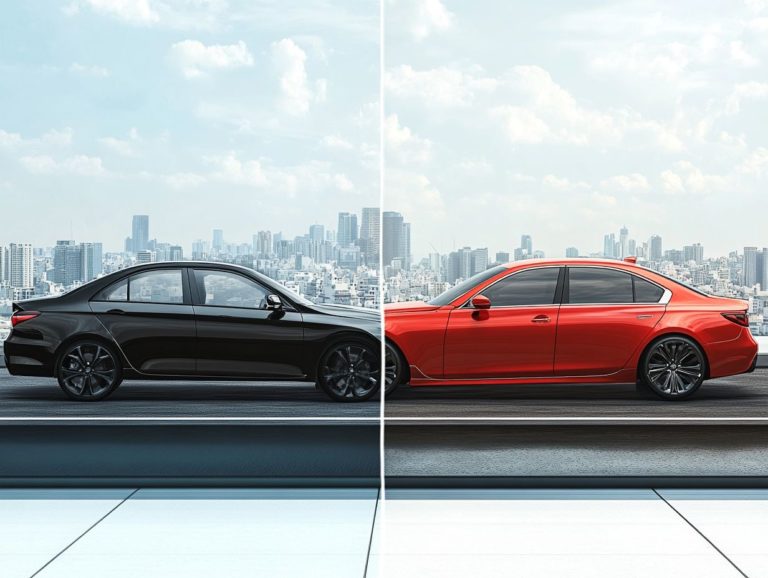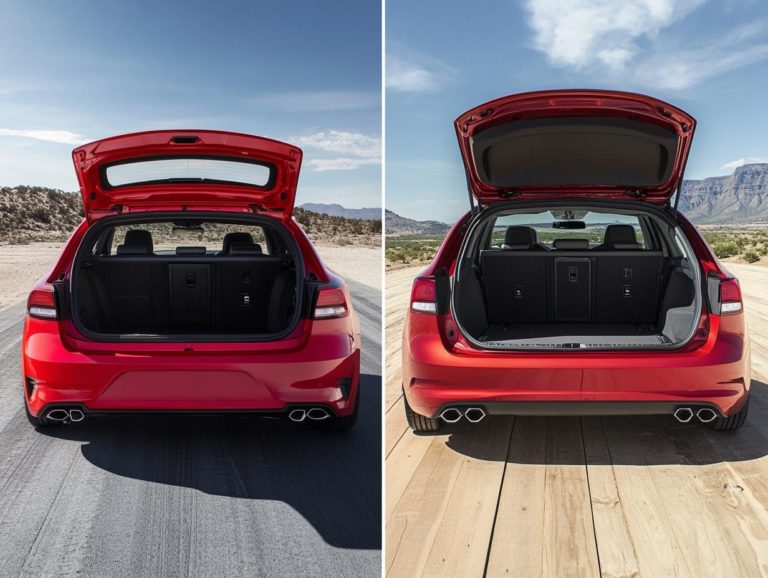Feature Comparison: SUVs vs. Crossovers
When selecting a vehicle, you often encounter the terms SUVs and crossovers. It s common to feel uncertain about the differences between the two and which might best suit your needs.
This article explores the definitions and features of both vehicle types, highlighting aspects such as body styles, performance, fuel efficiency, and cost. Whether you need ample space for family outings or a stylish daily driver, understanding the nuances of these vehicles will help you make an informed choice.
Contents
- Key Takeaways:
- Understanding SUVs and Crossovers
- Features of SUVs
- Features of Crossovers
- Comparison of Interior Space
- Comparison of Fuel Efficiency
- Cost Comparison
- Which is Right for You?
- Frequently Asked Questions
- What are the main differences between SUVs and crossovers?
- Which type of vehicle offers better fuel efficiency, SUVs or crossovers?
- Do SUVs or crossovers offer better off-road capabilities?
- What about towing capacity – which vehicle is better for hauling and towing?
- SUVs vs. Crossovers: What’s the Space Difference?
- Key Factors to Consider When Choosing Between an SUV and a Crossover
Key Takeaways:
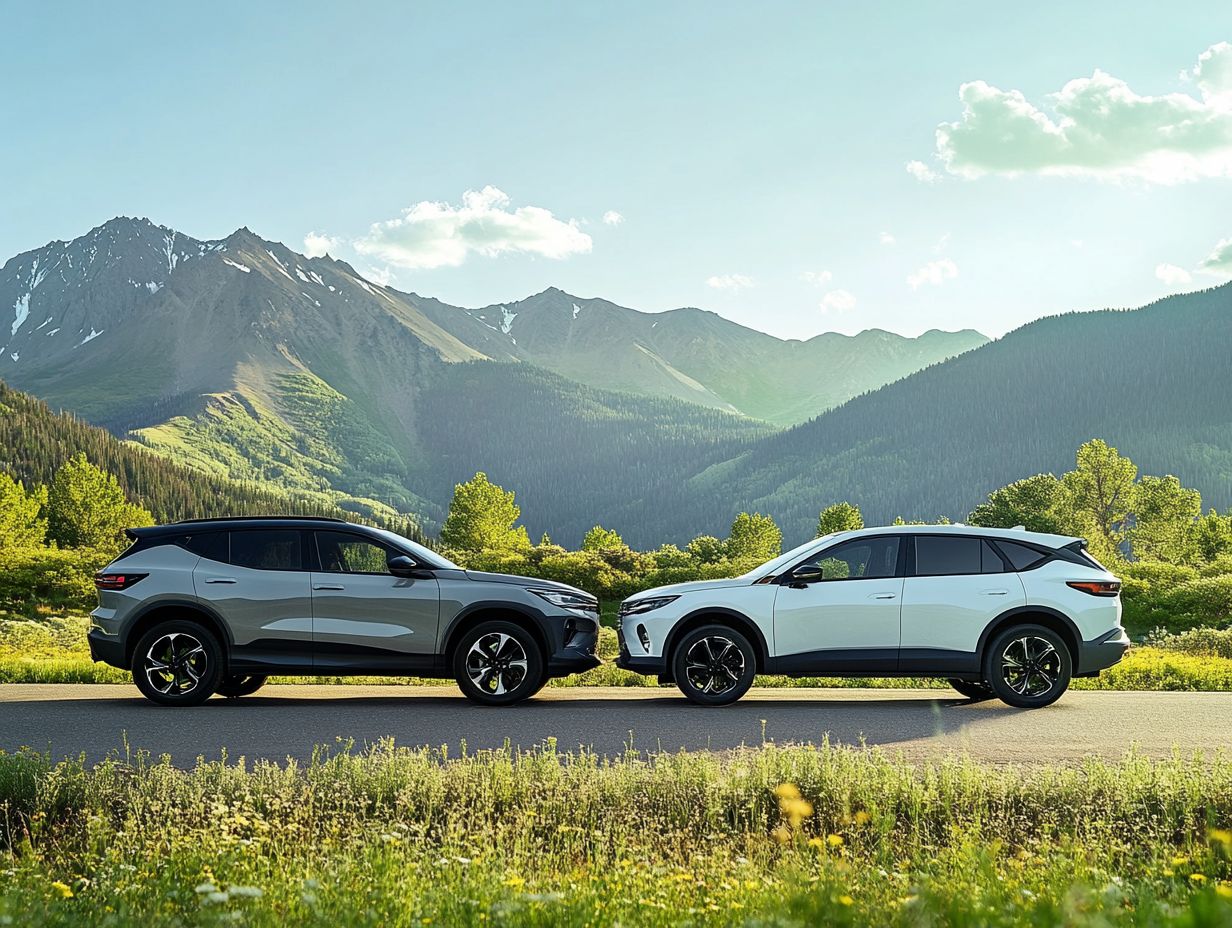
- Discover how SUVs and crossovers differ and find your perfect ride!
- SUVs provide more power and can tow heavier loads, while crossovers focus on fuel efficiency and a smoother ride.
- Consider your budget, desired interior space, and driving habits when choosing between an SUV or crossover. Each offers unique advantages based on your personal preferences.
Understanding SUVs and Crossovers
To grasp the differences between SUVs and crossovers, you need to appreciate their unique features and how they serve various consumer needs in the automotive world, including insights from price comparisons for SUVs for city driving.
SUVs, or Sport Utility Vehicles, typically use a stronger frame, allowing them to tackle rugged terrains. In contrast, crossovers utilize a single structure designed for urban living, which enhances comfort, safety, and fuel efficiency.
With numerous models from renowned manufacturers like Chevy Suburban and Honda CR-V you have a wealth of options that blend performance with the practicality needed for family trips and adventurous outings.
Definitions and Differences
The main distinction between SUVs and crossovers is their construction. SUVs use a stronger frame design, enhancing their towing and hauling capabilities. Crossovers, however, feature a single structure that promotes better fuel efficiency and a smoother ride. This key difference significantly impacts their performance and utility.
If you love SUVs, you likely appreciate their ruggedness and off-road capabilities, making them ideal for adventure seekers or those needing substantial cargo space. Conversely, if your daily commute is more urban, you might prefer crossovers, known for their lighter weight, which improves acceleration and handling on city streets. However, their softer construction may limit off-road performance.
By understanding these features, you can choose a vehicle that best fits your lifestyle, whether you prioritize power or comfort.
Features of SUVs
SUVs are characterized by their sturdy body style, impressive performance capabilities, and generous cargo space, making them an excellent choice for families and outdoor enthusiasts.
The elevated ride height enhances visibility and off-road capabilities. With modern features like all-wheel drive and cutting-edge safety systems, enjoy a comfortable driving experience, no matter the terrain.
Body Style, Size, and Performance
The body style of an SUV is defined by its larger dimensions and robust design, enhancing its remarkable utility and performance across various terrains.
These vehicles often feature higher ground clearance, a wider wheelbase, and ample cargo capacity, making them ideal for both city driving and off-road adventures. With different body styles compact, midsize, and full-size each option presents unique advantages in handling and maneuverability.
A compact SUV may excel in fuel efficiency and parking ease, while a full-size model offers impressive towing capabilities and spacious interiors.
By understanding these differences, you can find the right combination of comfort, performance, and practicality to align with your lifestyle needs.
Explore your options and visit a dealership today to find the perfect SUV or crossover for you!
Features of Crossovers
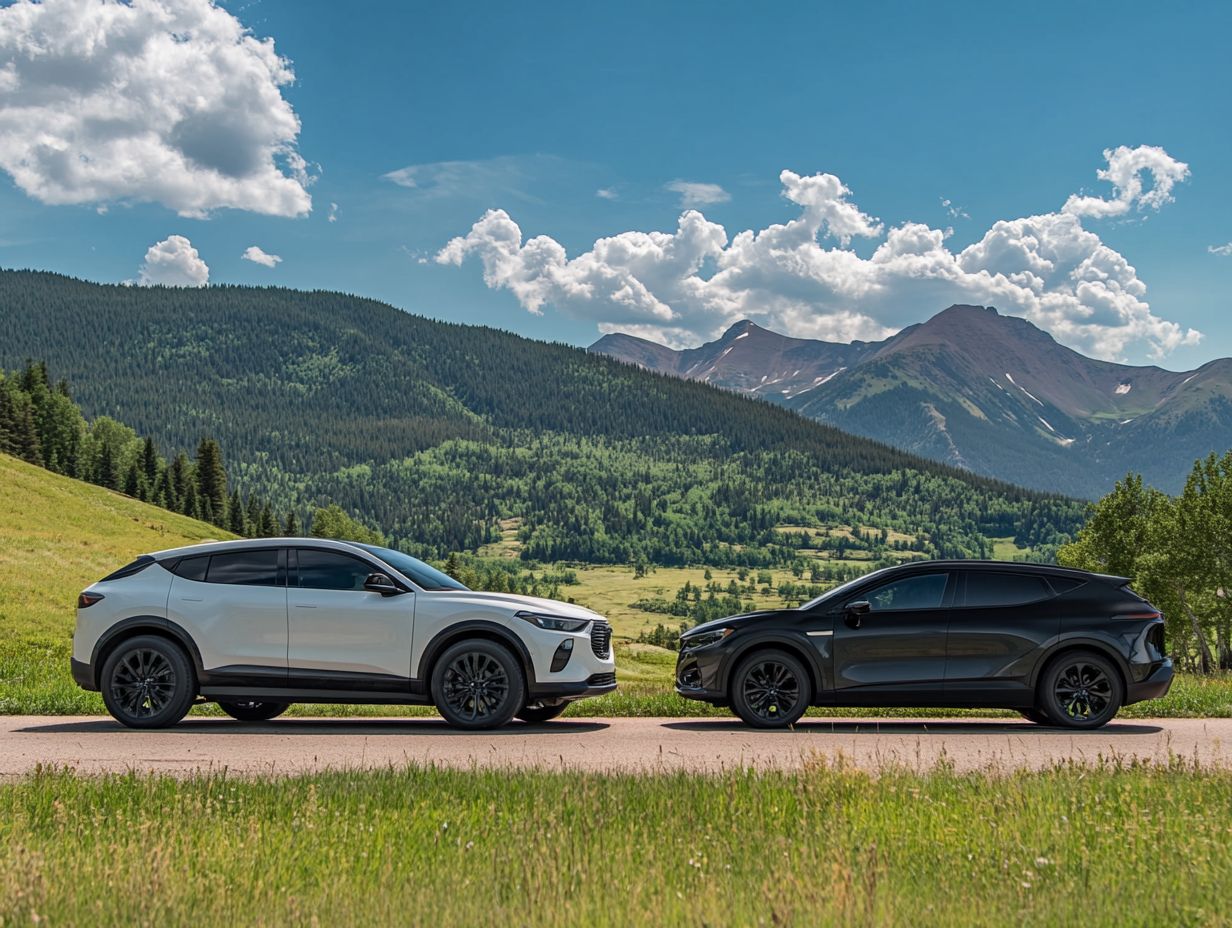
Crossovers feature a unibody construction, which means the body and frame are combined into one piece. This design enhances both comfort and fuel efficiency. It makes them a good mix of style and practicality for consumers.
Body Style, Size, and Performance
The body style of crossovers has a sleeker design compared to traditional SUVs. They focus on compact dimensions, which improve fuel economy and urban driving performance.
This streamlined silhouette boosts aerodynamics and contributes to a lighter overall weight. This allows your engine to operate more efficiently. You ll often find crossovers equipped with smaller, turbocharged engines that provide a balance of power and economy, making them ideal for city driving.
The chassis design enhances maneuverability, enabling you to glide through tight spaces and crowded streets with ease.
These features merge form and function, appealing to those who seek practicality without sacrificing style. This ultimately reshapes expectations in the automotive market.
Comparison of Interior Space
When comparing interior space, SUVs typically provide more cargo capacity and passenger seating than crossovers. This makes SUVs a better choice for families and individuals needing extra usefulness in their vehicles.
Cargo and Passenger Capacity
Cargo and passenger capacity are key features that differentiate SUVs from crossovers. SUVs generally provide greater space for both passengers and gear.
Many SUVs offer configurations with foldable second and third-row seats, allowing flexible cargo layouts for larger items or extra luggage. Some models even come with underfloor storage compartments, maximizing usefulness without sacrificing aesthetics. Thoughtful elements like wide door openings and low loading heights improve accessibility for families and individuals with mobility concerns.
These practical features make transitioning from a day out with friends to a weekend getaway easy, catering to your diverse lifestyle needs and ensuring versatility in transporting both passengers and belongings.
Comparison of Fuel Efficiency
Fuel efficiency is crucial when comparing SUVs and crossovers. Crossovers typically offer superior MPG ratings due to their lighter weight and unibody construction.
This enhances performance and leads to a reduced environmental impact, making crossovers a compelling choice for eco-conscious drivers.
MPG and Environmental Impact
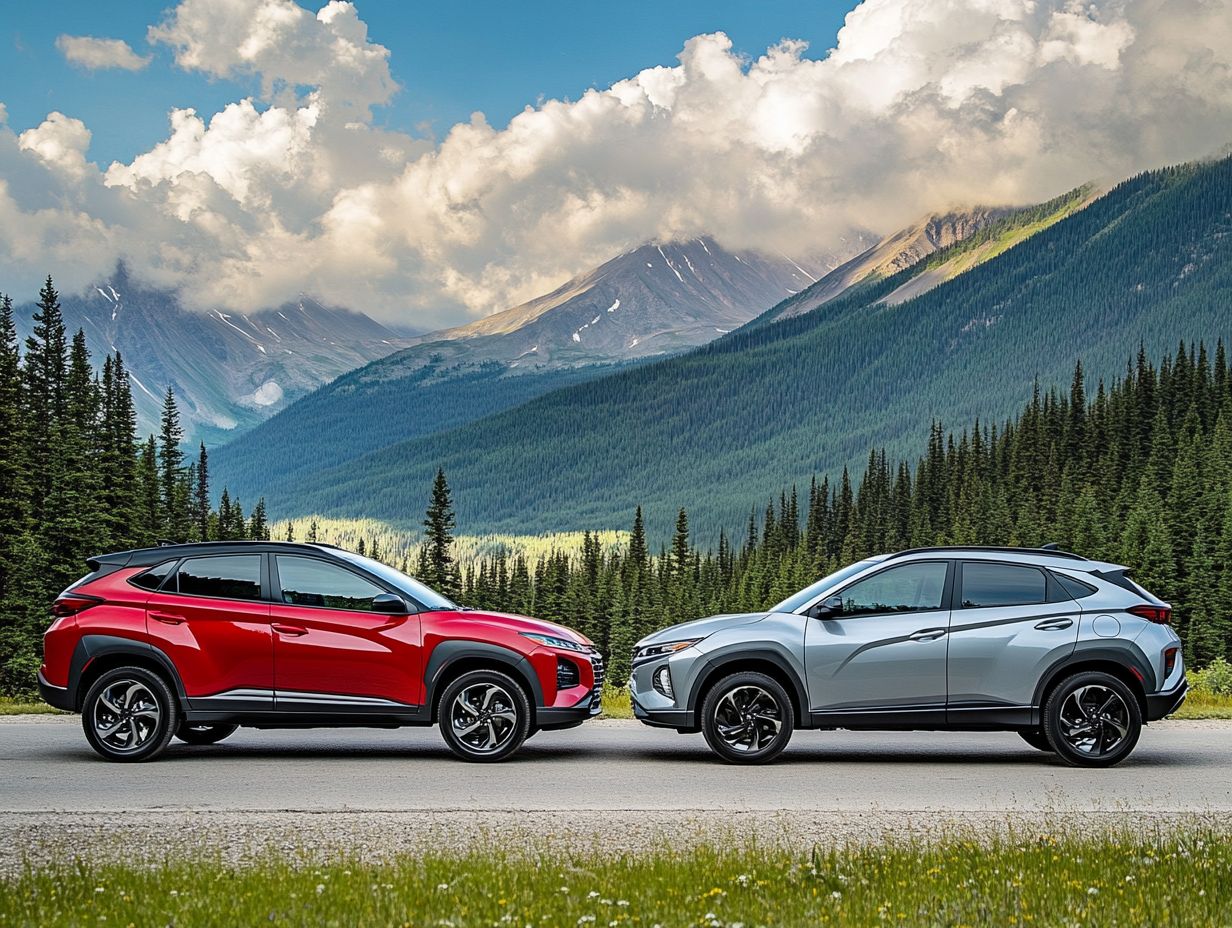
The MPG rating is a crucial factor reflecting the environmental impact of both SUVs and crossovers. Crossovers generally lead in this area thanks to their efficient engineering. This efficiency minimizes fuel consumption and reduces harmful emissions, a vital consideration in today s climate-conscious landscape.
When comparing the two vehicle types, it s clear that crossovers, often crafted with lighter frames and smaller engines, can deliver superior fuel economy without compromising versatility or comfort. Knowing how these ratings impact your environmental footprint is essential for making environmentally responsible choices.
Choosing a crossover can be a smart economic decision and contributes to a collective effort in reducing environmental degradation!
Cost Comparison
Understanding the cost comparison between SUVs and crossovers is essential for making an informed choice. It s not just about the initial purchase price; ongoing maintenance costs also play a critical role in your financial decision-making.
These factors significantly influence your overall experience and budget, ensuring you select the vehicle that best fits your lifestyle and financial goals.
Purchase Price and Maintenance Costs
The purchase price and maintenance costs for SUVs often differ significantly from those of crossovers, reflecting the unique features and performance capabilities each type offers.
Large SUVs like the Ford Expedition typically come with a hefty initial price tag that often exceeds $50,000. In contrast, smaller crossovers like the Honda HR-V start around $25,000. This price disparity can influence your financing options and long-term ownership costs.
In terms of maintenance, consider the Toyota 4Runner, renowned for its ruggedness. It may require more frequent servicing due to its ability to drive on rough terrain, resulting in higher upkeep expenses compared to the Honda CR-V, which is designed for a smoother ride and easier maintenance.
Fuel efficiency is another critical factor. While the Jeep Grand Cherokee boasts powerful engine options, its lower miles per gallon may lead to increased fuel costs over time.
Which is Right for You?
When deciding between an SUV and a crossover, think about your driving needs this decision impacts your adventures ahead! Consider your unique driving conditions, family needs, and personal preferences. Each vehicle type presents distinct advantages and features tailored to meet a variety of consumer demands.
Your choice reflects your lifestyle and priorities, ensuring that your vehicle aligns perfectly with your everyday experiences.
Considerations for Choosing Between SUVs and Crossovers
When choosing between SUVs and crossovers, it’s essential to weigh several factors, including your driving conditions, cargo space needs, family size, and personal style preferences. For valuable perspectives, consider checking out user insights on the best crossover vehicles.
Understanding the terrain you frequently navigate is key. SUVs shine in rugged environments, delivering robust performance and enhanced four-wheel drive a system that powers all four wheels helping you drive on tough terrains. Crossovers excel in urban settings, where maneuverability and fuel efficiency take center stage.
As you assess your lifestyle, consider what matters most. If you have a family with young children, spacious interiors and safety features found in some SUVs might be your top priority. Alternatively, if daily commutes are your focus, you might be drawn to the sleek design and practicality of a crossover.
Your personal aesthetic choices will certainly play a role in your decision, as each type appeals to different tastes and functional needs.
Frequently Asked Questions
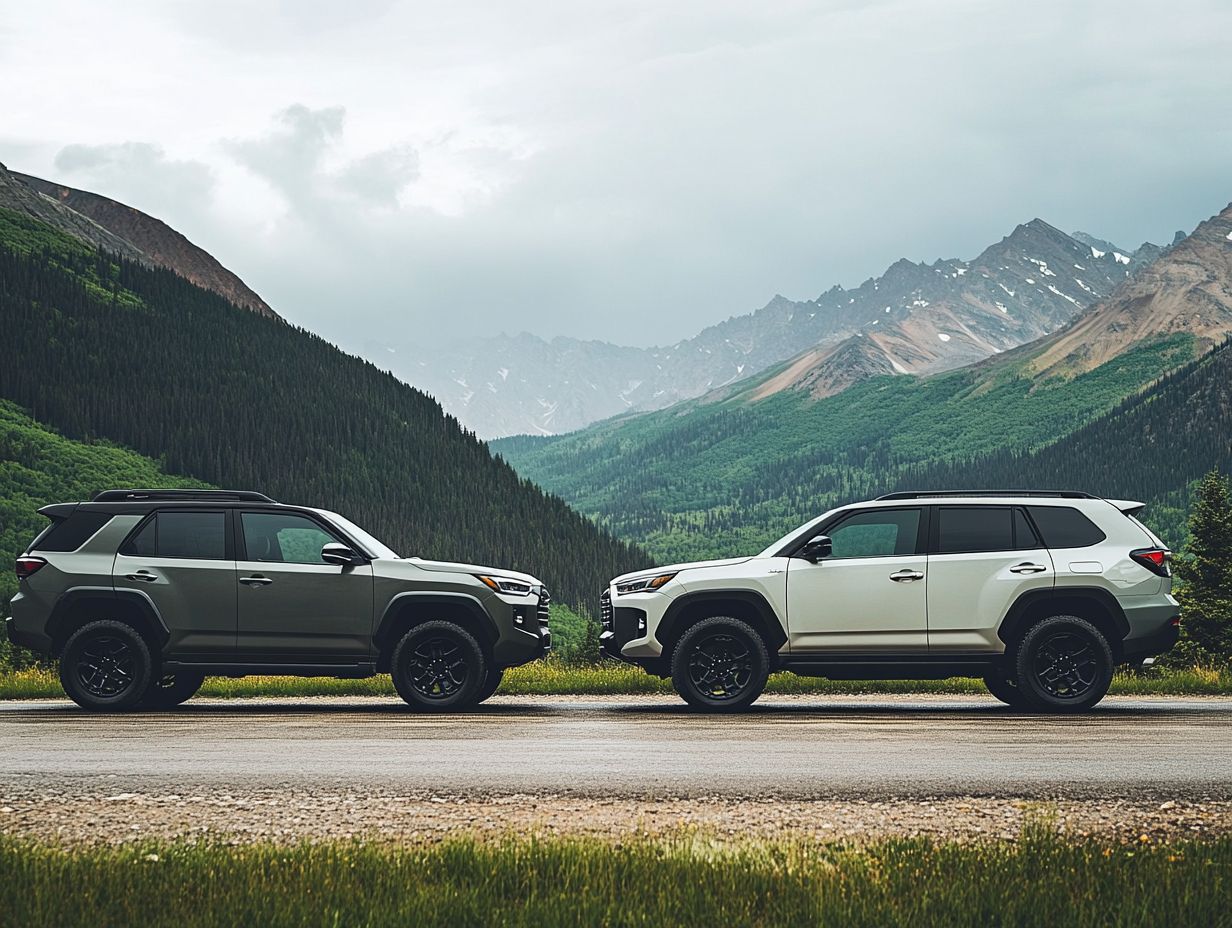
What are the main differences between SUVs and crossovers?
SUVs (Sport Utility Vehicles) and crossovers are both popular choices for drivers looking for a spacious and versatile vehicle. However, for those considering their options, a feature comparison of sedans vs. SUVs reveals that SUVs are typically larger and have a stronger frame design, while crossovers have a unibody construction and are smaller and more car-like in handling.
Which type of vehicle offers better fuel efficiency, SUVs or crossovers?
Crossovers generally offer better fuel efficiency compared to SUVs because they are built on a car platform, which is lighter and more aerodynamic, allowing for better fuel economy. SUVs, on the other hand, tend to have larger engines and a heavier build, resulting in lower fuel efficiency.
Do SUVs or crossovers offer better off-road capabilities?
SUVs are typically designed with off-road driving in mind and have features such as four-wheel drive and high ground clearance, making them better suited for rugged terrain. Crossovers, however, are not designed for off-roading and may not have the same capabilities as SUVs in this area.
What about towing capacity – which vehicle is better for hauling and towing?
Generally, SUVs have a higher towing capacity than crossovers due to their larger size and heavier build. SUVs also often come with features such as trailer sway control and a tow/haul mode for easier and safer towing. However, crossovers can still be capable of towing smaller loads and may be more suitable for those who only need to tow occasionally.
Ready to find your perfect vehicle? Visit your local dealership today!
SUVs vs. Crossovers: What’s the Space Difference?
Yes, there are differences in interior space and cargo capacity between SUVs and crossovers. SUVs generally offer more headroom, legroom, and overall room for passengers and cargo.
Crossovers, being smaller, may have less space and fewer storage options. However, they can still provide a comfortable and roomy interior.
Key Factors to Consider When Choosing Between an SUV and a Crossover
Consider the size differences, fuel economy (how far you can drive on a gallon of gas), and capabilities of each type. Other important factors include cost, driving experience, and your personal preferences.
SUVs often come with a higher price tag, but they deliver a more commanding view of the road and a robust, adventurous look. In contrast, crossovers tend to offer a smoother, car-like drive and are usually more budget-friendly. For those considering their options, a feature comparison: sedan vs. SUV can be quite helpful.

